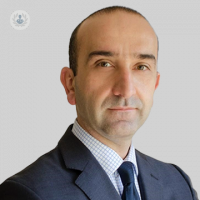Insights into gastric bypass surgery
Written in association with:Gastric bypass surgery, also known as Roux-en-Y gastric bypass, is an effective bariatric (weight loss) surgical procedure involving both restrictive and malabsorptive techniques to help achieve weight loss.
Here, Mr George Vasilikostas, renowned consultant general, gastrointestinal and bariatric surgeon, delves into the mechanisms of gastric bypass surgery.

What does a gastric bypass procedure entail?
A gastric bypass procedure is one of the commonest weight loss procedures. It has been around for more than 50 years and it has a proven safety efficiency, providing excellent results in terms of weight loss and quality of life.
Nowadays, a gastric bypass is performed almost exclusively via keyhole laparoscopic surgery. The basic principle of the procedure involves creating a small gastric pouch, by disconnecting the proximal part of the stomach from the distal part and then joining the small bowel with the small gastric pouch in order to be able to drain it.
With this configuration, food bypasses the whole distal stomach, the duodenum, and the first part of the bowel. As a result, undigested food travels straight to the bowel, triggering signals from the gut to the brain which is responsible for the body’s metabolic response. Changing these signals can reset metabolism, and this is why a gastric bypass is one of the most effective weight loss surgery procedures nowadays.
Is a gastric bypass considered major surgery?
I would say that a gastric bypass isn’t considered a major surgery anymore. The procedure does involve general anaesthetic, but this is extremely safe.
The typical hospital stay after a laparoscopic gastric bypass is one or two days. In selective low-risk patients, the procedure can even be performed as day case surgery.
The complication rate is also quite low, matching any other commonly-performed abdominal surgery like, for example, appendicectomy or cholecystectomy. There have been studies showing that the serious events from a gastric bypass surgery are pretty much the same as any other medical treatment that includes medication and lifestyle modifications.
Additionally, the risk of mortality for a gastric bypass is extremely low, below 1.1 – 1.2%. According to data from the National Bariatric Registry, the risk may even be well below this level.
Is a gastric bypass a painful procedure?
A laparoscopic gastric bypass is very well tolerated. Patients may feel mild to moderate amounts of abdominal discomfort or pain for the first one or two days, alongside a minimum amount of nausea, but this typically resolves soon.
The overall recovery process is also very straightforward. Obviously, patients will need to adhere to a special diet post-op, but other than that patients will pretty much be back to normal activities after one or two weeks.
How soon will I lose weight after undergoing gastric bypass surgery?
What is interesting is that, for the first few weeks to three months, the rate of weight loss after gastric bypass surgery is very quick and very impressive. During this period, patients can lose 15% -20% of their total weight or 30% of their excess weight.
Weight loss then typically continues after six months. Following this period, some patients will continue to lose weight for one, one and a half, or two years. Other patients will start to plateau in terms of weight loss within one year.
How successful is a gastric bypass? Could I regain the weight?
Gastric bypass surgery has proven its efficiency in the long term, helping patients lose 35% of their total weight or 60% - 70% of their excess weight in total following the procedure. Obviously, the response to a gastric bypass can vary, as with any other treatment for any other disease, but overall results suggest that patients can sustain their weight loss in the long term.
We also encourage patients, along with gastric bypass surgery, to engage with their healthcare team in order to implement positive behaviour and dietary changes that will optimise results and prevent weight regain in the future.
If you are considering gastric bypass surgery and would like to consult your options with an expert, schedule a consultation with Mr George Vasilikostas via his Top Doctors profile today.


